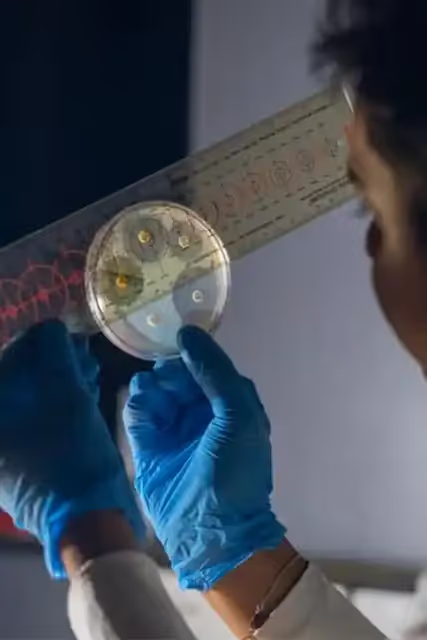How AMRx® streamlines healthcare in resource-limited settings






In 2019, the World Health Organization (WHO) estimated that bacterial antimicrobial resistance (AMR) directly caused 1.27 million deaths and contributed to a total of 4.95 million. Experts across health organisations, medicine, and academia agree that the overuse and misuse of antimicrobials in humans, animals, and plants are the main drivers behind the rise of drug-resistant pathogens.
In response to this growing threat, Andhra Pradesh became the fourth state in India to introduce its own State Action Plan on AMR in June 2022. The plan, titled the Andhra Pradesh Action Plan for the Containment of Antimicrobial Resistance, outlined various strategies to tackle AMR.
One key initiative was the adoption of a culture-free diagnostic tool powered by artificial intelligence (AI) and machine learning (ML). The tool, called AMRx®, was developed in collaboration with SCIINV Biosciences Private Limited and the Sathya Sai Institute of Higher Learning in Puttaparthi. It aims to help doctors predict bacterial infections and prescribe antibiotics more accurately, promoting the rational use of these medicines.
The tool is being integrated into Andhra Pradesh's government healthcare system, Dr Care, for use in public hospitals (APAP CAR report 2022, p. 53) “Integrating both these softwares takes time. We are doing multiple tests on compatibility,” said Dr Ratnakar Palakodeti, co-founder and director of SCIINV Biosciences Private Limited.
How AMRx® works
Normally, a patient tells the doctor their symptoms, and the doctor decides whether a culture test is needed. If they go ahead with the test, it identifies the cause and checks for antibiotic resistance. The doctor then prescribes the appropriate medication, but this process usually takes over 24 hours. To avoid delays, the doctor often starts the patient on antibiotics based on an educated guess, without waiting for the test results.
AMRx® changes all of that. It supports the doctor’s judgment, boosts their confidence, and often removes the need for a culture test altogether. With AMRx®, the entire process is much quicker and more efficient.
A conventional culture test costs Rs 800, but this machine learning model, trained on over 100 parameters across different demographics, provides rapid insights. It validates the doctor’s judgment, flags resistant antibiotics, and serves as a clinical decision support tool.
"The patient consults the physician, who uses the app. If the patient had visited earlier, all records are readily available on the application. Otherwise, the physician inputs clinical symptoms–such as the history of antibiotics and current symptoms–into the app. Within two minutes, the app processes the data, even in resource-limited facilities without diagnostic centers, and predicts bacterial infections and antibiotic resistance patterns instantly."
This approach supports physicians’ decisions, reduces reliance on culture tests, and offers cost-effective insights. “A conventional culture test costs Rs 800, but this machine learning model, trained on over 100 parameters across different demographics, provides rapid insights. It validates the doctor’s judgment, flags resistant antibiotics, and serves as a clinical decision support tool,” Dr Palakodeti added.
The tool won the Startup India Grant, the Federation of Asian Biotech Associations’ Best Startup Award, and the Economic Times Award for Industry Healthcare Solution of the Year.
Antibiotic stewardship
Antibiotic stewardship involves using antibiotics responsibly and only when needed. This includes selecting the right antibiotic, determining the correct dose, prescribing for the appropriate duration, and ensuring antibiotics are used exclusively for bacterial infections. The app has the potential to drastically cut down on antibiotic usage.
“The tool significantly reduces the diagnostic workload. If the app determines a negative case, antibiotics don’t need to be prescribed, thus avoiding unnecessary treatment. For example, 50 percent of cultures show negative results, yet 16 percent of such patients received empirical antibiotics which were unnecessary—something this tool can help prevent," said Dr BE Pradeep, the head of Antimicrobial Resistance Laboratory at the Satya Sai Institute of Higher Learning and the principal investigator who co-developed and clinically validated the tool.
"Between 2021 and 2023, we studied multiple hospitals across India and evaluated 15 different antibiotics for susceptibility. This tool is critical in controlling the emergence of AMR. It can integrate seamlessly with any hospital's Electronic Medical Information System (EMIS), capture essential data, and support antibiotic stewardship programs with instant updates,” he added
Implementation delays
Integrating AMRx® with the Dr Care platform, designed to create digital health records for patients visiting government health facilities in Andhra Pradesh, is a mammoth task. “Dr Care and AMRx® operate on different platforms, making integration necessary. Additionally, the data feeding process is time-consuming,” Dr Palakodeti said.
The tool's primary users are general physicians, and ensuring their adoption is crucial. In government hospitals, a general physician typically spends less than five minutes with each patient, juggling long hours and a heavy workload. AMRx® is designed to ease this burden, but many doctors may not be familiar with using technology.
"Some of the doctors are hesitant as they are not familiar with using technology," said Prof Rangineni Jayaprada, a microbiologist at Sri Venkateswara Institute of Medical Sciences (SVIMS) and co-principal investigator on the project. To address this, the team has been running intensive training sessions for two to three months, involving two doctors and two healthcare professionals from each government hospital across 30 medical colleges and hospitals.
The challenge is not just about rolling out a tool; it’s about ensuring it’s used effectively by those who need it most. This is where the project’s true potential lies: it’s not just a step forward for Andhra Pradesh—it’s a model that could scale across India, tackling antimicrobial resistance on a national level. The app’s success hinges on both technological integration and on-the-ground training, making it a critical experiment in how health tech can shift the entire ecosystem of healthcare in India. If it works here, it could change the way we think about tackling AMR everywhere.
{{quiz}}
Explore other topics
References
- https://biofaba.org.in/pdf/APAPCAR%20Report.pdf





.avif)





